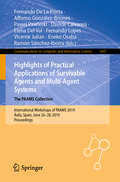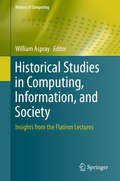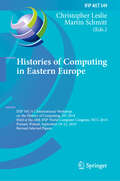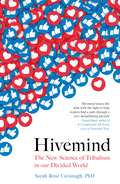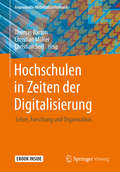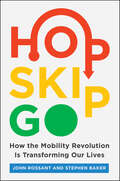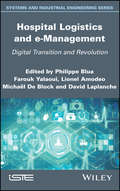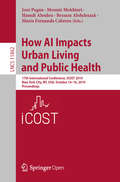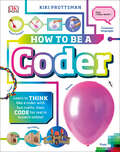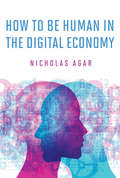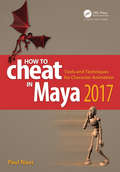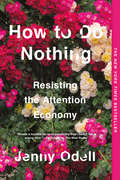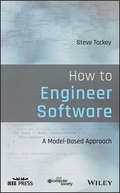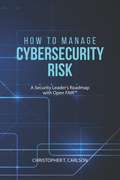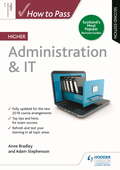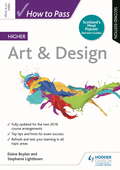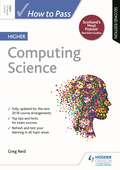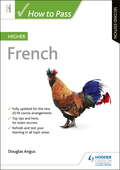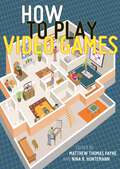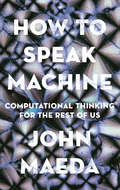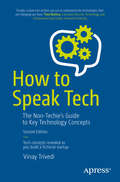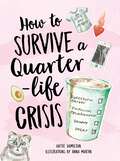- Table View
- List View
Highlights of Practical Applications of Survivable Agents and Multi-Agent Systems. The PAAMS Collection: International Workshops of PAAMS 2019, Ávila, Spain, June 26–28, 2019, Proceedings (Communications in Computer and Information Science #1047)
by Fernando De La Prieta Alfonso González-Briones Pawel Pawleski Davide Calvaresi Elena Del Val Fernando Lopes Vicente Julian Eneko Osaba Ramón Sánchez-IborraThis book constitutes the refereed proceedings of the workshops and special session co-located with the 17th International Conference on Practical Applications of Agents and Multi-Agent Systems, PAAMS 2019, held in Ávila, Spain, in June 2019.The total of 26 full and 8 short papers presented in this volume were carefully reviewed and selected from 47 submissions. The book also contains extended abstracts of the doctoral consortium contributions. The papers in this volume stem from the following meetings: Workshop on Agents-Based Solutions for Manufacturing and Supply Chain, AMSC; Second International Workshop on Blockchain Technology for Multi-Agent Systems, BTC4MAS; Workshop on MAS for Complex Networks and Social Computation; CNSC; Workshop on Multi-Agent Based Applications for Energy Markets, Smart Grids and Sustainable Energy Systems, MASGES; Workshop on Smart Cities and Intelligent Agents, SCIA; and Workshop on Swarm Intelligence and Swarm Robotics, SISR; as well as the special session on Software Agents and Virtualization for Internet of Things, SAVIoTS.
Historical Studies in Computing, Information, and Society: Insights from the Flatiron Lectures (History of Computing)
by William AsprayThis is a volume of chapters on the historical study of information, computing, and society written by seven of the most senior, distinguished members of the History of Computing field. These are edited, expanded versions of papers presented in a distinguished lecture series in 2018 at the University of Colorado Boulder – in the shadow of the Flatirons, the front range of the Rocky Mountains. Topics range widely across the history of computing. They include the digitalization of computer and communication technologies, gender history of computing, the history of data science, incentives for innovation in the computing field, labor history of computing, and the process of standardization. Authors were given wide latitude to write on a topic of their own choice, so long as the result is an exemplary article that represents the highest level of scholarship in the field, producing articles that scholars in the field will still look to read twenty years from now. The intention is to publish articles of general interest, well situated in the research literature, well grounded in source material, and well-polished pieces of writing. The volume is primarily of interest to historians of computing, but individual articles will be of interest to scholars in media studies, communication, computer science, cognitive science, general and technology history, and business.
Histories of Computing in Eastern Europe: IFIP WG 9.7 International Workshop on the History of Computing, HC 2018, Held at the 24th IFIP World Computer Congress, WCC 2018, Poznań, Poland, September 19–21, 2018, Revised Selected Papers (IFIP Advances in Information and Communication Technology #549)
by Christopher Leslie Martin SchmittThis book consitutes the refereed post-conference proceedings of the IFIP WG 9.7 International Workshop on the History of Computing, HC 2018, Held at the 24th IFIP World Computer Congress, WCC 2018, in Poznań, Poland, in September 2018.The 16 revised full papers were carefully reviewed and selected from 20 submissions. They reflect academic approaches to history along with the expertise of museum and other public history professionals as well as the experience of computingand information science practitioners. The papers are organized in the following sections: Eastern Europe, Poland, Soviet Union, CoCom and Comecon; analog computing, and public history.
Hivemind: The New Science of Tribalism in Our Divided World
by Sarah Rose CavanaghCavanagh brings you along on her journey through an exquisite collection of scholarly knowledge and empirical insight to ground both your mind and your gut. From zombies to bees, moral panics to conspiracy theories, Hivemind mixes the dark with the light to help readers find a path through a very destabilizing present' - Danah Boyd, author of It's Complicated: The Social Lives of Networked Teens'This fascinating book guides us through the nuanced landscape of why we think and behave the way we do-online and off-and offers a much-needed vision for how we can find our way back from the edge'- Scott Barry Kaufman, Psychologist at Columbia University and co-author of Wired to Create'Hivemind provides a fascinating tour of research that reveals our social nature, for good and for bad. Cavanagh is a natural teacher whose enthusiasm for psychology shines through on every page. Whether you're looking to have healthier technology habits, develop better relationships with others, or address societal challenges, this book will give you food for thought and wisdom to take action' - Kelly McGonigal, author of The Joy of Movement and The Willpower Instinct+++Hivemind: A collective consciousness in which we share consensus thoughts, emotions, and opinions; a phenomenon whereby a group of people function as if with a single mind.Our views of the world are shaped by the stories told by our self-selected communities. Whether seeking out groups that share our tastes, our faith, our heritage, or other interests, since the dawn of time we have taken comfort in defining ourselves through our social groups. But what happens when we only socialize with our chosen group, to the point that we lose the ability to connect to people who don't share our passions? What happens when our tribes merely confirm our world view, rather than expand it? Leading a narrative journey from the site of the Charlottesville riots to the boardrooms of Facebook, considering such diverse topics as zombies, neuroscience, and honeybees, psychologist and emotion regulation specialist Sarah Rose Cavanagh leaves no stone unturned in her quest to understand how social technology is reshaping the way we socialize. It's not possible to turn back the clocks, and Cavanagh argues that there's no need to; instead, she presents a fully examined and thoughtful call to cut through our online tribalism, dial back our moral panic about screens and mental health, and shore up our sense of community. With compelling storytelling and shocking research, Hivemind is a must-read for anyone hoping to make sense of the dissonance around us.
Hochschulen in Zeiten der Digitalisierung: Lehre, Forschung und Organisation (Angewandte Wirtschaftsinformatik)
by Thomas Barton Christian Müller Christian SeelDigitalisierung für Hochschulen – Dieses Buch zeigt, wie es gehtIn diesem Buch erfahren Sie alles zu Digitalisierungsprozessen an Hochschulen und Universitäten. Die Autoren erläutern die Herausforderungen für Lehre, Forschung und die interne Organisation und präsentieren ihre Lösungen zu: Digitalisierung von HochschulprozessenDigitalisierung des Studiums (der Forschung, Lehre und des Lernens)Informationssysteme an HochschulenAnwendungsszenarienDas Buch richtet sich in erster Linie an Führungskräfte und Lehrende im Hochschulbetrieb, aber ebenso an Projektleiter, Projektmitarbeiter und interessierte Studierende.Universität 4.0: Lernen Sie in diesem Buch neue Digitalisierungsstrategien für HochschulenDank vieler Beispiele und praxisnahen Anwendungen vermittelt Ihnen dieses Buch ein Gefühl für die Problematik und stellt verschiedene Digitalisierungskonzepte vor, welche die digitale Lehre in Hochschulen positiv beeinflussen können. Werfen Sie gemeinsam mit Prof. Dr. Thomas Barton, Prof. Dr. Christian Müller und Prof. Dr. Christian Seel einen Blick auf die vielfältigen Einsatzgebiete der Digitalisierung, wie: elektronische PrüfungeneLearning (u. a. MOOCs)die digitale Abgabe von Hausarbeitender Einsatz von Podcastselektronische AbstimmungssystemeAugmented RealityDas Buch zeigt Ihnen, dass die Digitalisierung gleichermaßen Auswirkungen auf das Hochschulmanagement und die Wissenschaft hat, wie etwa die Forschung und die dazugehörigen Forschungsprozesse.
Hop, Skip, Go: How the Mobility Revolution Is Transforming Our Lives
by Stephen Baker John RossantUrban expert John Rossant and business journalist Stephen Baker look beyond the false promises of the past to examine the real future of transportation and the repercussions for the world’s cities, the global economy, the environment, and our individual lives.Human mobility, dominated for a century by cars and trucks, is facing a dramatic transformation. Over the next decade, new networked devices, from electric bikes to fleets of autonomous cars, will change the way we move. They will also disrupt major industries, from energy to cars, give birth to new mobility giants, and lead to a redesign of our cities. For Rossant and Baker, this represents the advance of the Information Revolution into the physical world. This will raise troubling questions about surveillance, privacy, the dangers from hackers and the loss of jobs. But it also promises startling efficiencies, which could turn our cities green and, perhaps, save our planet.In an engaging, deeply reported book, the authors travel to mobility hotspots, from Helsinki to Shanghai, to scout out this future. And they visit the companies putting it together. One, Divergent3d, is devising a system to manufacture cars with robots and 3D printers. PonyAI, a Chinese-Silicon Valley startup, builds autonomous software that perceives potholes, oncoming trucks, and wayward pedestrians, and guides the vehicle around them. Voom, an Airbus subsidiary, is racing with dozens of others to operate fleets of air taxis that fly by themselves.Hop, Skip, Go is about us: billions of people on the move. Underlying each stage of mobility, from foot to horse to cars and jets, are the mathematics of three fundamental variables: time, space and money. We measure each trip we take, whether to Kuala Lumpur or the corner drugstore. As the authors make clear, the coming mobility revolution will be no different. As they unveil the future, the authors explore how these changes might revamp our conception of global geography, the hours in our days, and where in the world we might be able to go.
Hospital Logistics and e-Management: Digital Transition and Revolution
by Lionel Amodeo Farouk Yalaoui Philippe Blua Michaël De Block David LaplancheAs new information and communication technologies (NICTs) increasingly reorganize our practices and influence our daily lives, there is a pressing need to study their impact in the field of hospital logistics and to question their future use. Hospital Logistics and e-Management presents an inventory of the health information system, and deals with informational and logistical issues with regard to medical information. Through two case studies of hospital logistics systems which have drawn on academic research, this book examines how powerful decision support tools can improve the quality of patient service and logistics organization. The first case study deals with the influx of patients to emergency services and service organization, and the second with the optimization of product collection and distribution flows.
How AI Impacts Urban Living and Public Health: 17th International Conference, ICOST 2019, New York City, NY, USA, October 14-16, 2019, Proceedings (Lecture Notes in Computer Science #11862)
by José Pagán Mounir Mokhtari Hamdi Aloulou Bessam Abdulrazak María Fernanda CabreraThis open access book constitutes the refereed proceedings of the 17th International Conference on String Processing and Information Retrieval, ICOST 2019, held in New York City, NY, USA, in October 2019. The 15 full papers and 5 short papers presented in this volume were carefully reviewed and selected from 24 submissions. They cover topics such as: e-health technology design; well-being technology; biomedical and health informatics; and smart environment technology.
How to Be a Coder: Learn to Think like a Coder with Fun Activities, then Code in Scratch 3.0 Online (Careers for Kids)
by Kiki ProttsmanLearn to think like a coder without a computer! Each of the fun craft activities included in this book will teach you about a key concept of computer programming and can be done completely offline. Then you can put your skills into practice by trying out the simple programs provided in the online, child-friendly computer language Scratch.This crafty coding book breaks down the principles of coding into bite-sized chunks that will get you thinking like a computer scientist in no time. Learn about loops by making a friendship bracelet, find out about programming by planning a scavenger hunt, and discover how functions work with paper fortune tellers. Children can then use their new knowledge to code for real by following the clear instructions to build programs in Scratch 3.0.Perfect for kids aged 7-9, the various STEAM activities will help teach children the crucial skills of logical thinking that will give them a head-start for when they begin programming on a computer. Famous scientist pages teach children about coding pioneers, such as Alan Turing and Katherine Johnson, and topic pages, such as the Internet, give kids a wider understanding of the subject.Written by computer science expert Kiki Prottsman, How to be a Coder is so much fun kids won't realize they're learning!
How to Be Human in the Digital Economy (The\mit Press Ser.)
by Nicholas AgarAn argument in favor of finding a place for humans (and humanness) in the future digital economy.In the digital economy, accountants, baristas, and cashiers can be automated out of employment; so can surgeons, airline pilots, and cab drivers. Machines will be able to do these jobs more efficiently, accurately, and inexpensively. But, Nicholas Agar warns in this provocative book, these developments could result in a radically disempowered humanity.The digital revolution has brought us new gadgets and new things to do with them. The digital revolution also brings the digital economy, with machines capable of doing humans' jobs. Agar explains that developments in artificial intelligence enable computers to take over not just routine tasks but also the kind of “mind work” that previously relied on human intellect, and that this threatens human agency. The solution, Agar argues, is a hybrid social-digital economy. The key value of the digital economy is efficiency. The key value of the social economy is humanness.A social economy would be centered on connections between human minds. We should reject some digital automation because machines will always be poor substitutes for humans in roles that involve direct contact with other humans. A machine can count out pills and pour out coffee, but we want our nurses and baristas to have minds like ours. In a hybrid social-digital economy, people do the jobs for which feelings matter and machines take on data-intensive work. But humans will have to insist on their relevance in a digital age.
How to Cheat in Maya 2017: Tools and Techniques for Character Animation (How To Cheat)
by Paul NaasThis is not a book about Maya software with a few animation pointers thrown in here and there. This is a guide to Maya software written by professional animators. This book provides you with complete, set-by-step walkthroughs of essential animation techniques that increase your speed and efficiency while using Maya 2017 for character animation. From curves to constraints, this book covers all of the methods available in the latest version of Maya. Featuring gold-mine coverage this book teaches you new techniques for working with characters in animation tests and short films. Accompanied by a companion site, this is the one and only guide to get you up to speed. <P><P>Key Features <li>Complete step-by-step, walkthroughs of essential techniques every animator needs to know. <li>Features interviews with leading experts and experienced animation leads. <li>Companion web site including all exercise/example scene files and extras such as video tutorials and animation files. <li>Interlude articles covering everything from Reference Video to Resumes.
How to Do Nothing: Resisting the Attention Economy
by Jenny OdellA galvanizing critique of the forces vying for our attention—and our personal information—that redefines what we think of as productivity, reconnects us with the environment, and reveals all that we’ve been too distracted to see about ourselves and our world <P><P>Nothing is harder to do these days than nothing. But in a world where our value is determined by our 24/7 data productivity . . . doing nothing may be our most important form of resistance. So argues artist and critic Jenny Odell in this field guide to doing nothing (at least as capitalism defines it). <P><P>Odell sees our attention as the most precious—and overdrawn—resource we have. Once we can start paying a new kind of attention, she writes, we can undertake bolder forms of political action, reimagine humankind’s role in the environment, and arrive at more meaningful understandings of happiness and progress. <P><P>Far from the simple anti-technology screed, or the back-to-nature meditation we read so often, How to do Nothing is an action plan for thinking outside of capitalist narratives of efficiency and techno-determinism. Provocative, timely, and utterly persuasive, this book is a four-course meal in the age of Soylent. <P><P><b>A New York Times Bestseller</b>
How to Engineer Software: A Model-Based Approach
by Steve TockeyA guide to the application of the theory and practice of computing to develop and maintain software that economically solves real-world problem How to Engineer Software is a practical, how-to guide that explores the concepts and techniques of model-based software engineering using the Unified Modeling Language. The author—a noted expert on the topic—demonstrates how software can be developed and maintained under a true engineering discipline. He describes the relevant software engineering practices that are grounded in Computer Science and Discrete Mathematics. Model-based software engineering uses semantic modeling to reveal as many precise requirements as possible. This approach separates business complexities from technology complexities, and gives developers the most freedom in finding optimal designs and code. The book promotes development scalability through domain partitioning and subdomain partitioning. It also explores software documentation that specifically and intentionally adds value for development and maintenance. This important book: Contains many illustrative examples of model-based software engineering, from semantic model all the way to executable code Explains how to derive verification (acceptance) test cases from a semantic model Describes project estimation, along with alternative software development and maintenance processes Shows how to develop and maintain cost-effective software that solves real-world problems Written for graduate and undergraduate students in software engineering and professionals in the field, How to Engineer Software offers an introduction to applying the theory of computing with practice and judgment in order to economically develop and maintain software.
How to Manage Cybersecurity Risk: A Security Leader's Roadmap with Open FAIR
by Christopher T CarlsonProtecting information systems to reduce the risk of security incidents is critical for organizations today. This writing provides instruction for security leaders on the processes and techniques for managing a security program. It contains practical info
How to Pass Higher Administration & IT: Second Edition Epub
by Adam Stephenson Anne BradleyExam Board: SQA Level: Higher Subject: Administration & IT First Teaching: August 2018 First Exam: May 2019Get your best grade with comprehensive course notes and advice from Scotland's top experts, fully updated for the latest changes to SQA Higher assessment. How to Pass Higher Administration & IT Second Edition contains all the advice and support you need to revise successfully for your Higher exam. It combines an overview of the course syllabus with advice from top experts on how to improve exam performance, so you have the best chance of success.- Revise confidently with up-to-date guidance tailored to the latest SQA assessment changes - Refresh your knowledge with comprehensive, tailored subject notes- Prepare for the exam with top tips and hints on revision techniques- Get your best grade with advice on how to gain those vital extra marks
How to Pass Higher Art & Design: Second Edition Epub
by Elaine Boylan Stephanie LightbownExam Board: SQA Level: Higher Subject: Art & Design First Teaching: August 2018 First Exam: May 2019Get your best grade with comprehensive course notes and advice from Scotland's top experts, fully updated for the latest changes to SQA Higher assessment. How to Pass Higher Art & Design Second Edition contains all the advice and support you need to revise successfully for your Higher exam. It combines an overview of the course syllabus with advice from top experts on how to improve exam performance, so you have the best chance of success.- Revise confidently with up-to-date guidance tailored to the latest SQA assessment changes - Refresh your knowledge with comprehensive, tailored subject notes- Prepare for the exam with top tips and hints on revision techniques- Get your best grade with advice on how to gain those vital extra marks
How to Pass Higher Art & Design, Second Edition (How To Pass - Higher Level)
by Elaine Boylan Stephanie LightbownExam Board: SQA Level: Higher Subject: Art & Design First Teaching: August 2018 First Exam: May 2019Get your best grade with comprehensive course notes and advice from Scotland's top experts, fully updated for the latest changes to SQA Higher assessment. How to Pass Higher Art & Design Second Edition contains all the advice and support you need to revise successfully for your Higher exam. It combines an overview of the course syllabus with advice from top experts on how to improve exam performance, so you have the best chance of success.- Revise confidently with up-to-date guidance tailored to the latest SQA assessment changes - Refresh your knowledge with comprehensive, tailored subject notes- Prepare for the exam with top tips and hints on revision techniques- Get your best grade with advice on how to gain those vital extra marks
How to Pass Higher Computing Science: Second Edition Epub (How To Pass - Higher Level Ser.)
by Greg ReidExam Board: SQA Level: Higher Subject: Computing Science First Teaching: August 2018 First Exam: May 2019 Get your best grade with comprehensive course notes and advice from Scotland's top experts, fully updated for the latest changes to SQA Higher assessment. How to Pass Higher Computing Science Second Edition contains all the advice and support you need to revise successfully for your Higher exam. It combines an overview of the course syllabus with advice from a top expert on how to improve exam performance, so you have the best chance of success.- Revise confidently with up-to-date guidance tailored to the latest SQA assessment changes - Refresh your knowledge with comprehensive, tailored subject notes- Prepare for the exam with top tips and hints on revision techniques- Get your best grade with advice on how to gain those vital extra marks
How to Pass Higher Computing Science, Second Edition (How To Pass - Higher Level)
by Greg ReidExam Board: SQA Level: Higher Subject: Computing Science First Teaching: August 2018 First Exam: May 2019 Get your best grade with comprehensive course notes and advice from Scotland's top experts, fully updated for the latest changes to SQA Higher assessment. How to Pass Higher Computing Science Second Edition contains all the advice and support you need to revise successfully for your Higher exam. It combines an overview of the course syllabus with advice from a top expert on how to improve exam performance, so you have the best chance of success.- Revise confidently with up-to-date guidance tailored to the latest SQA assessment changes - Refresh your knowledge with comprehensive, tailored subject notes- Prepare for the exam with top tips and hints on revision techniques- Get your best grade with advice on how to gain those vital extra marks
How to Pass Higher French: Second Edition Epub
by Douglas AngusExam Board: SQA Level: Higher Subject: French First Teaching: August 2018 First Exam: May 2019Get your best grade with comprehensive course notes and advice from Scotland's top experts, fully updated for the latest changes to SQA Higher assessment. How to Pass Higher French Second Edition contains all the advice and support you need to revise successfully for your Higher exam. It combines an overview of the course syllabus with advice from a top expert on how to improve exam performance, so you have the best chance of success.- Revise confidently with up-to-date guidance tailored to the latest SQA assessment changes - Refresh your knowledge with comprehensive, tailored subject notes- Prepare for the exam with top tips and hints on revision techniques- Get your best grade with advice on how to gain those vital extra marks
How to Pass Higher French, Second Edition (How To Pass - Higher Level)
by Douglas AngusExam Board: SQA Level: Higher Subject: French First Teaching: August 2018 First Exam: May 2019Get your best grade with comprehensive course notes and advice from Scotland's top experts, fully updated for the latest changes to SQA Higher assessment. How to Pass Higher French Second Edition contains all the advice and support you need to revise successfully for your Higher exam. It combines an overview of the course syllabus with advice from a top expert on how to improve exam performance, so you have the best chance of success.- Revise confidently with up-to-date guidance tailored to the latest SQA assessment changes - Refresh your knowledge with comprehensive, tailored subject notes- Prepare for the exam with top tips and hints on revision techniques- Get your best grade with advice on how to gain those vital extra marks
How to Play Video Games (User's Guides to Popular Culture #1)
by Nina B HuntemannForty original contributions on games and gaming culture What does Pokémon Go tell us about globalization? What does Tetris teach us about rules? Is feminism boosted or bashed by Kim Kardashian: Hollywood? How does BioShock Infinite help us navigate world-building? From arcades to Atari, and phone apps to virtual reality headsets, video games have been at the epicenter of our ever-evolving technological reality. Unlike other media technologies, video games demand engagement like no other, which begs the question—what is the role that video games play in our lives, from our homes, to our phones, and on global culture writ large? How to Play Video Games brings together forty original essays from today’s leading scholars on video game culture, writing about the games they know best and what they mean in broader social and cultural contexts. Read about avatars in Grand Theft Auto V, or music in The Legend of Zelda: Ocarina of Time. See how Age of Empires taught a generation about postcolonialism, and how Borderlands exposes the seedy underbelly of capitalism. These essays suggest that understanding video games in a critical context provides a new way to engage in contemporary culture. They are a must read for fans and students of the medium.
How to Speak Machine: Computational Thinking for the Rest of Us
by John MaedaVisionary designer and technologist John Maeda defines the fundamental laws of how computers think, and why you should care even if you aren't a programmer."Maeda is to design what Warren Buffett is to finance." --WiredJohn Maeda is one of the world's preeminent interdisciplinary thinkers on technology and design. In How to Speak Machine, he offers a set of simple laws that govern not only the computers of today, but the unimaginable machines of the future. Technology is already more powerful than we can comprehend, and getting more powerful at an exponential pace. Once set in motion, algorithms never tire. And when a program's size, speed, and tirelessness combine with its ability to learn and transform itself, the outcome can be unpredictable and dangerous. Take the seemingly instant transformation of Microsoft's chatbot Tay into a hate-spewing racist, or how crime-predicting algorithms reinforce racial bias.How to Speak Machine provides a coherent framework for today's product designers, business leaders, and policymakers to grasp this brave new world. Drawing on his wide-ranging experience from engineering to computer science to design, Maeda shows how businesses and individuals can identify opportunities afforded by technology to make world-changing and inclusive products--while avoiding the pitfalls inherent to the medium.
How to Speak Tech: The Non-Techie’s Guide to Key Technology Concepts
by Vinay TrivediThings you’ve done online: ordered a pizza, checked the weather, booked a hotel, and reconnected with long-lost friends. Now it’s time to find out how these things work. Vinay Trivedi peels back the mystery of the Internet, explains it all in the simplest terms, and gives you the knowledge you need to speak confidently when the subject turns to technology. This revised second edition of How to Speak Tech employs the strategy of the popular first edition: through the narrative of setting up a fictitious startup, it introduces you to essential tech concepts. New tech topics that were added in this edition include the blockchain, augmented and virtual reality, Internet of Things, and artificial intelligence.The author’s key message is: technology isn’t beyond the understanding of anyone! By breaking down major tech concepts involved with a modern startup into bite-sized chapters, the author’s approach helps you understand topics that aren’t always explained clearly and shows you that they aren’t rocket science. So go ahead, grab this book, start to “speak tech,” and hold your own in any tech-related conversation!What You'll LearnUnderstand the basics of new and established technologies such as blockchain, artificial intelligence (AI), augmented and virtual reality (AR and VR), Internet of Things (IoT), software development, programming languages, databases, and moreListen intelligently and speak confidently when technologies are brought up in your businessBe confident in your grasp of terms and technologies when setting up your own organization's applicationWho This Book Is ForStudents who want to understand different technologies relevant to their future careers at startups and established organizations, as well as business and other non-technical professionals who encounter and require an understanding of key technical terms and trends to succeed in their rolesReviews“Finally, a book non-techies can use to understand the technologies that are changing our lives.” Paul Bottino, Executive Director, Technology and Entrepreneurship Center, Harvard University“A great book everyone can use to understand how tech startups work.” Rene Reinsberg, Founder at Celo; Former VP of Emerging Products, GoDaddy“Through the simplicity of his presentation, Vinay shows that the basics of technology can be straightforwardly understood by anyone who puts in the time and effort to learn.” Joseph Lassiter, Professor of Management Science, Harvard Business School and Harvard Innovation Lab
How to Survive a Quarter-Life Crisis: A Comfort Blanket for Twenty-Somethings
by Hattie HamiltonMy 'life goals before 25' when I was 20: mortgage, become an MD or social media sensation, have good hair, have my own sustainable coffee shop, travel to 98 countries.My life goals on the eve of my 25th birthday: afford my rent without getting overdrawn this month, get at least two likes on my Instagram post on my new shoes, remember to pluck nose hairs before work, stop mislaying my refillable coffee cup, visit my parents once a month.Is it just me, or does everyone else have their shit together?Believe me, you’re not alone! If you’re having sleepless nights about your latest social media post, think that you’re a bit of a loser in love, or have a job that you hate (but you need the money and there are no full-time poet positions out there), then this book is your life-jacket and comfort blanket rolled into one sweet package. Learn why you’re not the failure you think you are, and why actually you’re well on your way to being a flawed-but-brilliant grown-up, as this guide helps you navigate your way through the choppy waters of your quarter-life crisis.
